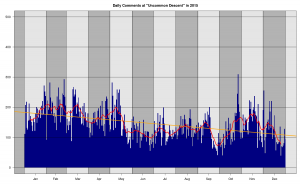December 20th, 2015 is the tenth anniversary of the decision in Tammy Kitzmiller, et al. v. Dover Area School District, et al.
Judge Jones (a Bush-appointed Republican) wrote a 139-page legal opinion which can be summarized thus:
Teaching intelligent design in public school biology classes violates the Establishment Clause of the First Amendment to the Constitution of the United States (and Article I, Section 3, of the Pennsylvania State Constitution) because intelligent design is not science and “cannot uncouple itself from its creationist, and thus religious, antecedents.”
— wikipedia article, side bar
Despite the precedent set by Kitzmiller/Dover, creationist and Intelligent Design advocates continue to battle to remove teaching of evolution from public schools and to protect teachers who insert biblical creationist or ID speculations into science classes.
I found this interesting essay in response to our current “friend” John West from 2007, when JW applauded passage of Louisiana creationism law.
All sorts of laws advance secular purposes—that’s what laws are supposed to do, and the Constitution assumes as much—but no law may advance a merely religious purpose under the Constitution. Thus those who lobby for law to advance a religious purpose are indeed under a disadvantage, one traceable to the Constitution itself,which purposely erects a roadblock in the path of those who would want to use the government to propagate a religion. It does not erect a similar roadblock to those who would use the government for secular purposes[see essay for footnote], whether it be to set up a fire department, or run the U.S. Army, or the Post Office, or whether it be to teach students about biological science. It is therefore perfectly valid for a secularist to attack the religious motivations of her political opponents, while simultaneously rallying her own political supporters to secularism.
— Timothy Sandefur
I think it’s particularly interesting that Sandefur identifies the non-symmetry between trying to advance religious purposes and trying to advance secular ones, which I know many religious people mistake.
Happy anniversary, y’all



